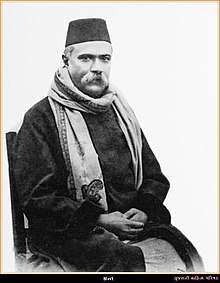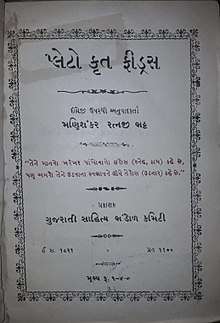Kavi Kant
Manishankar Ratnji Bhatt (Gujarati: મણિશંકર રત્નજી ભટૃ), popularly known as Kavi Kant (Gujarati: કવિ કાન્ત) was a Gujarati poet, playwright and essayist. He is an innovator of Khandkavya, a typical Gujarati poetic form and narration of one episode. His book Purvalap (1923) is a landmark in Gujarati poetry.[1]
Manishankar Ratnji Bhatt Kant | |
|---|---|
 Kavi Kant | |
| Native name | મણિશંકર રત્નજી ભટ્ટ |
| Born | Manishankar Ratnji Bhatt 20 November 1867 Chavand, Baroda State, British India (now Amreli district, Gujarat, India) |
| Died | June 16, 1923 (aged 55) Between Lahore and Rawalpindi on train, British India |
| Pen name | Kant |
| Occupation | Poet, essayist, playwright |
| Language | Gujarati |
| Nationality | Indian |
| Education | Bachelor of Arts |
| Alma mater | Bombay University |
| Genres | Khandkavya, play, essay |
| Notable works |
|
| Spouse | Narmada |
Life
Kavi Kant was born in Prashnora Brahman Family on 20 November 1867 in Chavand, a village in Amreli Prant of Baroda state, to Motibahen and Ratnaji Bhatt. His family's influence left him with a deep interest in both education and philosophy. He was a student of both Hindu and Biblical philosophy. He took his primary education at Mangrol, Morbi and Rajkot. He completed his Bachelor of Arts in 1888 from Bombay University with Logic and Moral philosophy subjects. He served as a teacher at Surat in 1889. From 1890 to 1898, he served as Professor and then Vice principal at Kalabhavan, Vadodara.[2] He was on tour to Kashmir in 1923. While returning to Lahore from Rawalpindi in train, he died en route on 16 June 1923.[3]
Conversion
In 1891 his first wife Narmada died. The death of his wife affected Kant deeply, and he could not find solace in his own religion. His search for answers about life and death led him to the philosophy of Emanuel Swedenborg. His writings provided some relief for his grief and he converted to Christianity in 1898. His family and friends opposed his decision and due to public and political opposition, he had to give up his position as minister of education in the Bhavnagar State. The community shunned both him and his family. Kant took the decision to leave the community and his family, for the sake of his wife and children. Realizing the repercussions of Kant's decision, the King of Bhavnagar along with some of his friends formed an "intervention" of sorts to ask him to change his mind. He realized that he could not stand to see his family suffer because of this decision. He missed them dearly and did not want to be apart from them.[3]
Literary work
He wrote one poetry book called Purvalap (1923) that was released on the day he died. He invented a form of poetry called "Khand-Kavya", one type of Narrative poetry, in Gujarati.[1] He also wrote the plays Salimshah Athva Ashrumati, Roman-Swarajya, Dukhi Sansar and Guru Govindsinh between 1908 and 1914.[3]
References
- Das, Sisir Kumar (1991). History of Indian Literature: 1911-1956, struggle for freedom : triumph and tragedy. New Delhi: Sahitya Akademi. p. 573. ISBN 978-81-7201-798-9.
- Kothari, Jayant (1990). "Bhatt Manishankar Ratnji". In Topiwala, Chandrakant (ed.). Gujarati Sahityakosh (Encyclopedia of Gujarati Literature) (in Gujarati). 2. Ahmedabad: Gujarati Sahitya Parishad. p. 418.
- "સવિશેષ પરિચય: મણિશંકર ભટ્ટ 'કાન્ત', ગુજરાતી સાહિત્ય પરિષદ". Manishankar Bhatt Kant, Gujarati Sahitya Parishad (in Gujarati). Retrieved 6 June 2015.
External links
- Kavi Kant on GujLit
